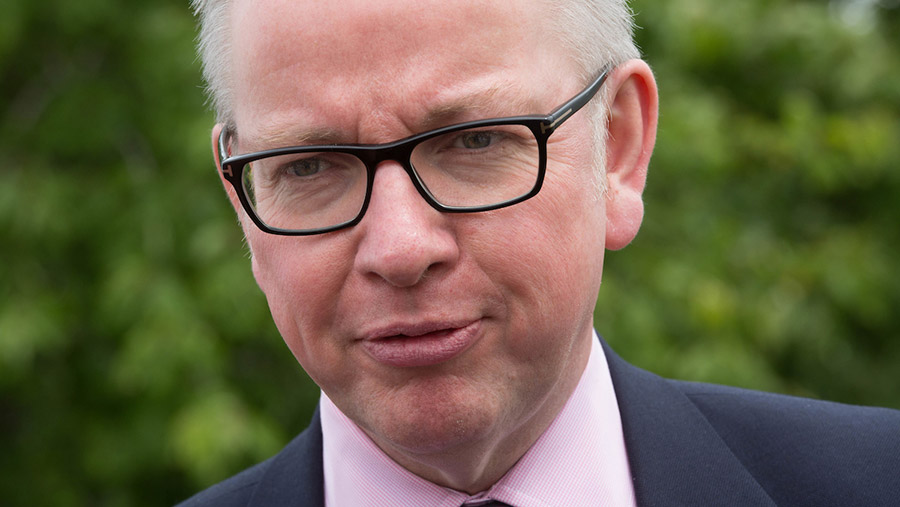Farm leader seeks clarity on Gove’s food standards pledge
 Michael Gove © Tim Scrivener
Michael Gove © Tim Scrivener Farm leaders continue to seek guarantees that producers won’t be undermined by a flood of sub-standard food imports after the UK leaves the European Union.
The warning comes despite a pledge by Defra secretary Michael Gove to give a written undertaking to maintain British food standards after Brexit. International trade secretary Liam Fox has offered similar guarantees in the past.
But the NFU said it remained unclear whether British standards would also apply to shipments of food coming into the country – fuelling concerns that a no-deal Brexit could see farmers exposed to imports produced using methods that are illegal in the UK.
See also: Gove reaffirms pledge to protect British food standards
Chief among those concerns are imports of chlorine-washed chicken and hormone-treated beef. Both production methods are illegal in the UK but widely used in the US, which is seeking access to the British market after Brexit.
Speaking at the Lincolnshire Farming Conference on Tuesday (26 February), NFU chief Brexit and international trade adviser Gail Soutar said the union was still trying to pin down the government on what it actually meant by British food standards – and who they would apply to.
Ms Soutar said: “It has been reassuring that the government has – a number of times – tried to be clear by saying that they will not lower our food standards in future trade deals – whether that is with the US or with others around the world.”
‘Multitude of standards’
But she added: “We are really trying to pin the government down here. What do they mean by food standards? As British farmers, you face multiple mandatory costs – whether that is animal welfare, environmental legislation, minimum wage levels or other labour requirements.
“You face a multitude of standards that are legislative standards the government requires of you. All we are saying is that imports should be produced on a level playing field – to the standards to which British farmers are required to adhere.”
The issue went well beyond food standards, Ms Soutar told 300 delegates at the Lincolnshire conference. “Of course, the government is going to continue to ensure that our food is safe on our plate. What we are talking about here are standards in the broader sense.”
The NFU has described the issue as “absolutely critical”. Mr Gove promised last month to put his pledge to maintain British food standards in writing and sent the letter by “first-class post” to NFU president Minette Batters.
No-deal Brexit ‘still a real threat’ to farmers
A no-deal Brexit looks increasingly unlikely – after Theresa May announced that leaving the EU could be delayed if MPs vote down her withdrawal deal.
In a vote expected on 12 March, the prime minister will present parliament with a choice between her deal and a no-deal Brexit – or delaying Brexit beyond the Article 50 withdrawal date of 29 March. MPs have already indicated they will reject a no-deal Brexit.
NFU president Minette Batters said the announcement meant a no-deal Brexit looked increasingly unlikely – but the union remains concerned that the possibility has only been delayed rather than ruled out altogether.
The prime minister’s statement that there may be a vote on extending Article 50 lessened the chances of leaving with no deal, said Ms Batters But she warned: “Any extension of Article 50 does not take ‘no deal’ off the table completely, it would simply delay the exit date.
Mrs May herself had said any such extension would not be lengthy, Ms Batters added. “Therefore, there would continue to be no certainty for British farmers as to what our trading relationship would be with the EU after this date.
“I maintain it is unacceptable for British businesses, including farmers, to be in this position. It is vital that, if there is to be an extension, that time is spent productively by parliament in delivering a deal which will work for Britain.
“Simply delaying Article 50 and the associated uncertainty is not going to help British farmers and food producers – and wider British business – by itself.”
